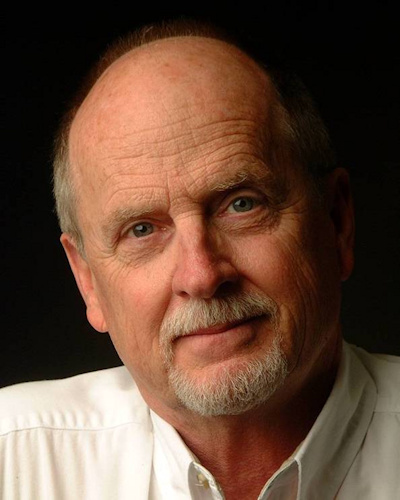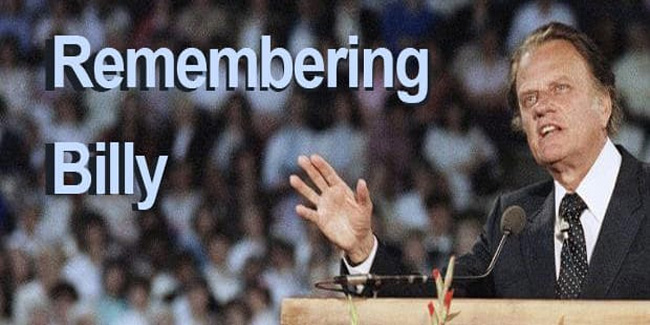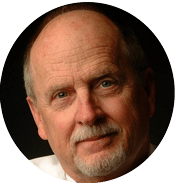Remembering Billy
 Mel White (The Ghostwriter of Billy Graham)
Mel White (The Ghostwriter of Billy Graham)
Billy Graham is dead. He was my friend and I mourn his passing. For two years I was Billy’s ghostwriter. I traveled with him, met him in hotel rooms and backstage at his massive rallies and interviewed him for hours at a time. We went on long walks, visited bookstores (to see where his books were placed), ate in restaurants that offered him a secluded corner and worked with him on writing projects that were dear to his heart. I have to confess that from my childhood Billy Graham was my hero. I had no idea that one day I would be his ghostwriter.
At twelve I began listening to Billy preach on his “Hour of Decision” radio broadcast. At fifteen I took busloads of my high school friends to his evangelistic crusade in San Francisco. All through the 1950s and 1960s, I watched Billy’s television specials and the full length movies produced by Billy Graham’s World Wide Pictures – For Pete’s Sake, Mr. Texas, The Restless Ones, The Hiding Place. I dreamed that one day I would preach like Billy and even produce Christian motion pictures of my own. My feelings about Billy Graham shaped in my childhood and youth are rather biased in his favor. Everyone does not agree. While the first President Bush called Graham “America’s Pastor,” Harry Truman labeled Graham a “counterfeit” and a “publicity seeker.”[i]
Whatever history calls Billy Graham I have to confess that he was a primary influence in shaping my earliest Christian beliefs. So you can imagine my surprise in 1982 when Billy Graham himself called me from Acapulco, Mexico, to see if I would be interested in helping him write his next book. That same night I flew from Seattle to Acapulco to meet my hero for the first time and to my surprise, Billy was waiting for me at curbside driving an open jeep. Billy and Ruth were taking a few days off in a beachfront condo loaned them by a supporter. During the months that followed he talked while I recorded his rather passionate feelings about the four horsemen of the apocalypse described by John in Revelation 6: war, famine, pestilence, and death.
Billy Graham was the last real evangelical. Evangelical has its roots in the beautiful Greek word “evangel” or good news. For most of his ministry, sharing the Good News was Billy Graham’s primary goal. He was often criticized for not raising his powerful voice against war, famine, pestilence and death. Until meeting him in Acapulco, I had no idea that Billy Graham was determined to speak prophetically on those issues as well. In the book we were writing together, Approaching Hoofbeats, Billy wanted to speak truth to power. He was determined to remind Christian believers that God calls us to “do justice; love mercy; and walk humbly.” In Acapulco I listened to a man who made it clear that being “born again” is not enough. God’s spirit calls us to work for peace as well, to feed the hungry, care for the sick, and confront the powers that lead to death for our planet and for all those who live upon it. I’ll never forget the stories he told me from his own life that illustrated his change of heart.
Shortly after his first visit to India, Billy was invited to the White House by President Eisenhower. After a few minutes of “mindless chatter,” Billy told the President of children and old people he had seen lying in the streets of Calcutta, malnourished, sick and dying. Being a farmer’s kid himself, Billy knew that the year’s harvest of wheat, oats and barley had been plentiful and that the nation’s grain elevators were full to overflowing.
“We must send tons of grain to feed the hungry people,” Billy told Ike, apparently with the same enthusiasm he called people to “come forward and be born again.” Ike admitted that he too had felt that way after seeing starvation across Europe—that is, until he had a conversation with John Foster Dulles, his Secretary of State. Eisenhower summoned Dulles to give Billy a lesson in world trade.
“The Secretary of State told me,” Billy remembers, “that if we donated tons of grain to feed the starving, the price of grain would drop and American farmers would suffer. He told me that in the long run more good would be done if grain prices remained stabilized and the America farmer out of harm’s way.” Billy paused and then said quietly, “I believed him then. I don’t believe him now. We are followers of Jesus who commanded that we feed the poor and if obeying that command causes prices to fall and profit margins to narrow, so be it.”
When finished, Billy’s book, Approaching Hoof Beats, was rich in personal stories that illustrated what must be done if we are to stop the four horsemen: war, famine, plague, and death. “Even in Eisenhower’s time we could hear the hoof beats,” Billy told me. “But now they are upon us and when we don’t answer Christ’s call to do justice and love mercy,” he warned, “when we don’t feed the hungry and house the homeless, when we don’t welcome and care for the outcast we sin and the Bible promises that we will be judged for that sin.”
Coming from Billy Graham, this new sermon was strong stuff especially since the stories came directly out of the life and experiences of an evangelist with a prophet’s heart. But when galleys of the book came back from the editors and the all-too-protective members of Billy’s team, many of the most dramatic stories were missing. I understood why it was risky to condemn the rich for neglecting the poor when the Billy Graham Evangelistic Association had to raise $100 million or more a year, much of it from wealthy donors. I knew it was dangerous to confront the politicians who sat on the stage at Billy’s crusades for ignoring the world’s needs and I realized that the more fundamentalist pastors in Billy’s camp would accuse the evangelist of getting off track with his sudden interest in “the social gospel.” But during our time together it was exciting to hear Billy Graham raising his powerful voice on behalf of people who were hungry, thirsty, sick, naked, homeless, outcast and in prison. And it broke my heart to see Billy’s entourage – for whatever reason – force him to focus on saving souls and in the process silence the prophet in their midst.
Now, looking back, I can understand why Billy’s handlers didn’t want their man to get into more trouble. He was already under fire by supporters for taking his stand against the arrogant and dangerous spirit of fundamentalism in newspaper interviews, press conferences and talk shows. Billy was using his own quiet voice to show the difference between an evangelical and a fundamentalist and those same fundamentalists, once his most loyal friends, were howling.
Fundamentalist Christian leaders accused Graham of: “breaking down the walls of biblical separation between sound and apostate churches,” and for “sending thousands of converts back into Roman Catholic and modernistic churches that preach heretical gospels,” and for “claiming that Pope John Paul II was a moral and spiritual leader and that when he died surely went to heaven,” and for “accepting an honorary degree from a Catholic university” and for “inviting Catholic bishops, Jewish Rabbis, and even Muslim clerics to sit with him on the platform of his citywide evangelistic campaigns.”[ii]
Perhaps fundamentalists were most angry at Billy Graham because he dared to imply that people could find God through other religions. They claimed that in a 1985 newspaper interview, Graham expressed the belief that those outside of Christ might be saved. In fact, he just left the judgment in God’s hands when Los Angeles reporter David Colker asked Graham: “What about people of other faiths who live good lives but don’t profess a belief in Christ?” Graham replied, “I’m going to leave that to the Lord. He’ll decide that.”[iii]
Graham infuriated fundamentalist Christians when he said, “I used to think that pagans in far-off countries were lost—were going to hell—if they did not have the Gospel of Jesus Christ preached to them. I no longer believe that. … I believe there are other ways of recognizing the existence of God—through nature, for instance—and plenty of other opportunities, therefore, of saying yes to God.”[iv]
Equally infuriating to fundamentalist Christians was Graham’s stand on biblical inerrancy, the cornerstone that holds the entire fundamentalist superstructure together. “I believe the Bible is the inspired, authoritative word of God,” Graham says, “but I don’t use the word ‘inerrant’ because it’s become a brittle divisive word.”[v]
At the same time Jerry Falwell, Pat Robertson, James Dobson and other fundamentalist Christians were vilifying President Clinton for his infidelity and calling for his impeachment, Billy Graham said: “I forgive him because I know the frailty of human nature and I know how hard it is, and especially a strong vigorous young man like he is—he has such a tremendous personality. I think the ladies just go wild over him.”[vi]
When asked about abortion on ABC’s “Good Morning America” Graham said, “There is a Christian position [on abortion], I think. But I’m not prepared to say what it is.”[vii] Two weeks later on the same program Graham added, “There are occasions when abortion is the only alternative.” At the same time fundamentalist media gurus were raising millions to end a woman’ right to choose, Billy Graham, the nation’s foremost evangelical, refused to be drawn into the fight.
He handled the controversy around homosexuality in exactly the same way. When asked about it on a 20/20 television interview Graham answered, “I think that the Bible teaches that homosexuality is a sin, but the Bible also teaches that pride is a sin, jealousy is a sin, and hate is a sin, evil thoughts are a sin, and so I don’t think that homosexuality should be chosen as the overwhelming sin that we are doing today.”[viii]
During the contentious battle over Oregon’s Proposition 9 Graham was asked by a chairman of his evangelistic crusade in Portland to endorse the measure that would require the state of Oregon to declare homosexuality a condition that was “abnormal, wrong, unnatural and perverse.” Graham replied, “I intend to stay out of national and local politics while here. God loves all people whatever their ethnic or political background or their sexual orientation… Christians take opposing views on many issues…Those on both sides of the issue must love each other.”[ix]
In June, 1994, shortly after the release of my autobiography Stranger at the Gate, Billy Graham sat down to answer questions from America’s leading newspaper publishers. That Q&A session was taped live by CSPAN. Mike Pride, editor of the Concord Monitor, asked Dr. Graham a question about a letter I had written asking Billy to meet with me to discuss the tragic consequences of the fundamentalist anti-homosexual campaign: “Dr. White has expressed frustration that after such a long and close professional relationship, you’ve spurned his attempts to speak with you since his coming out.”
Graham, obviously unaware that I had written, faxed and phoned his headquarters trying to schedule a meeting, answered, “If I saw him today, I’d gladly put my arms around him and hug him. I believe we should love homosexuals. God loves homosexuals. Homosexuality is called a sin in the Bible in the Old Testament. It’s not mentioned in the New Testament except in the first chapter of Romans…But I love them and welcome them to our meetings. [Mel is] welcome to come and see me, have lunch with me, whatever…I didn’t know of any instigation on his part to get to me. Perhaps he did. But I’m surrounded by a lot of people who try to protect me.”
Billy Graham is dead and I’m grieving because I won’t be able to see my friend again. I’m grieving because over the decades his prophetic voice was silenced by associates who had to “protect” his ministry from controversy and financial loss. I’m grieving because Billy was too ill to condemn Donald Trump’s assault on our democracy and on the war he and his Republican colleagues are waging against my LGBQ and especially my Trans sisters and brothers, against Americans who were brought her as children and are now facing the possibilities of deportation, against people of color especially black men, against Muslims and people of other faiths, against immigrants with or without papers, against the disabled, the poor and the homeless. And I’m grieving because Billy’s son, Franklin, thinks he’s representing the views of his father when in fact he’s simply parroting the views of his fundamentalist friends and undermining every good thing his father said or did.
Goodbye Billy. History will remember you as the twentieth century evangelist who called billions around the world to be born again. But I will remember you as the man who said, “Being born again is not enough. We are also called to do justice, love mercy and live humbly. Those who are born again,” he added, “must also feed the hungry, care for the sick, house the homeless and confront the powers that lead to death for our planet and for all those who live upon it.”
[i] Harry Truman quoted in Time Magazine, June 14, 1999.
[ii] For the typical fundamentalist critique of Billy Graham and dozens of other Christian leaders see Rick Miesel’s Biblical Discernment Ministries, www.rapidnet.com/~jbeard/bdm/exposes.
[iii] Billy Graham in the Los Angeles Herald Examiner, July 22, 1985, from David Cloud’s Fundamental Baptist Information Service, fbns@wayoflife.org.
[iv] Billy Graham in a 1978 issue of McCall’s on Rick Miesel’s Biblical Discernment Ministries Web Page, http://www.rapidnet.com/~jbeard/bdm/exposes/graham/general.htm.
[v] Attributed to Billy Graham in Newsweek magazine, April 26, 1982, by Rick Miesel, op.cit.
[vi] Billy Graham on the NBC “Today Show” March 5, 1998.
[vii] Billy Graham on Good Morning America, September 5, 1991.
[viii] Billy Graham in a 20/20 television interview, May 2, 1997
[ix] Billy Graham in The Statesman Journal, Portland, Oregon, Sept. 22, 1992



 Mel White (The Ghostwriter of Billy Graham)
Mel White (The Ghostwriter of Billy Graham)